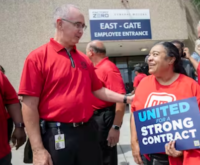By DAVID ESPO and STEVE PEOPLES
Associated Press
DES MOINES, Iowa (AP) _ Two days from judgment by the voters, President Barack Obama and Mitt Romney raced across competitive battleground states on Sunday, stressing differences on the economy, health care and more while professing a willingness to work across party lines to end gridlock in Washington.
“You have the power,” Obama, the most powerful political leader in the world, told thousands of cheering supporters in New Hampshire as the race moved toward a close finish.
Boos from Romney’s partisans in Cleveland turned to appreciative laughter when the Republican nominee began a sentence by saying, “If the president were to be elected,” and ended it with, “It’s possible but not likely.”
After a campaign than began more than a year ago, late public opinion polls were unpredictably tight for the nationwide popular vote. But they suggested an advantage for the president in the state-by-state competition for electoral votes that will settle the contest.
Conceding nothing, Romney set his first foray of the fall into Pennsylvania. The state last voted for a Republican presidential candidate in 1988, but the challenger and his allies began advertising heavily in the campaign’s final days.
“ He’s offering excuses. I’ve got a plan” to fix the economy. “I can’t wait for us to get started,” Romney said in a new television commercial, possibly the last of the campaign, as he appeared in Iowa, Ohio, and Virginia as well as Pennsylvania.
In Des Moines, he said he would meet regularly with “good men and women on both sides of the aisle” in Congress. Later, in Cleveland, he said of Obama, “Instead of bridging the divide, he’s made it wider.”
Obama had New Hampshire, Florida, Ohio and Colorado in his sights for the day, and judging from the polls, a slight wind at his back. So much so that one conservative group cited a string of surveys that favor the president as it emailed an urgent plea for late-campaign donations so it could end his time in the White House.
In New Hampshire, the president said he wants to work across party lines, but said he won’t give up priorities such as college financial aid or the health care law he pushed through Congress.
“That’s not a price I’m willing to pay,” he said, a reference to Romney’s frequent pledge to dismantle the health law that Republicans derided as “Obamacare.”
The two rivals and their running mates flew from state to state as the last of an estimated 1 million campaign commercials were airing in a costly attempt to influence a diminishing pool of voters.
More than 27 million ballots have been cast in 34 states and the District of Columbia, although none will be counted until Election Day on Tuesday.
Nearly 4 million of them were deposited by Floridians, and Democrats cited unprecedented demand for pre-election day voting as they filed a lawsuit demanding an extension of available time.
As they did about almost everything else in the campaign, aides to Obama and Romney disagreed about the political significance of the early voting.
“Early voting is going very well for us,” said David Plouffe, a top White House aide, adding a prediction on ABC’s “This Week” that the president will win a second term on Tuesday.
But Rich Beeson, Romney’s political director, said “they are underperforming and we are overperforming” in terms of turning out early and absentee votes turned compared with 2008. Romney and Wisconsin Rep. Paul Ryan “will be elected the next president and vice president of the United States,” he predicted on “Fox News Sunday.”
Obama and Romney disagree sharply about the approach the nation should take to the slow-growth economy and high unemployment, and the differences have helped define the campaign. Most notably, Romney wants to extend tax cuts that are due to expire without exception, while Obama wants to allow them to expire on incomes over $250,000.
At the same time, polls show bipartisanship is popular, in the abstract, at least, which accounts for the emphasis the candidates are placing in the race’s final days on working across political aisles.
Romney frequently cites his ability to work with the Democratic-controlled Legislature while he was governor of Massachusetts, although he rarely mentions the veto battles he had.
Obama’s term has been littered with the legislative wreckage left behind by constant struggles with congressional Republicans. Yet his trip to New Jersey last Wednesday was a model of nonpartisanship as he accompanied Republican Gov. Chris Christie on a tour of destruction caused by Superstorm Sandy. The governor repeatedly praised the administration’s response to the storm.
One prominent Republican said the storm had worked to Romney’s disadvantage in a different way.
“The hurricane is what broke Romney’s momentum. I don’t think there’s any question about it,” former Mississippi Gov. Haley Barbour said on CNN’s “State of the Union.”
“Any day that the news media is not talking about jobs and the economy, taxes and spending, deficit and debt, Obamacare and energy, is a good day for Barack Obama,” he said. “Now, whether it will be good enough remains to be seen.”
Romney’s campaign wanted no part of that. “I don’t look at what happened with the storm and how it affected so many people through a political lens,” said a spokesman, Kevin Madden.
So intense was the campaigning that Vice President Joe Biden’s plane and the one carrying Romney were both on the tarmac in Cleveland at the same time in early afternoon. The two men did not see one another.
Biden’s assignment for the day was to rally voters across Ohio. “These guys are trying to play a con game here at the end,” he said of Romney and Ryan, whom he accused of posing as more moderate than they are.
Ryan started out in his home state of Wisconsin. He donned a Green Bay Packers jacket and a yellow and green striped tie for a pregame tailgating party he attended briefly across the street from fabled Lambeau Field.
Then, football or no football, it was off to Ohio, Minnesota and Colorado.
___
Espo reported from Washington. Associated Press writers Julie Pace in Florida; Kasie Hunt and Matthew Daly in Ohio; Phil Elliott in Wisconsin; and Beth Fouhy and Josh Lederman in Washington contributed to this report.










